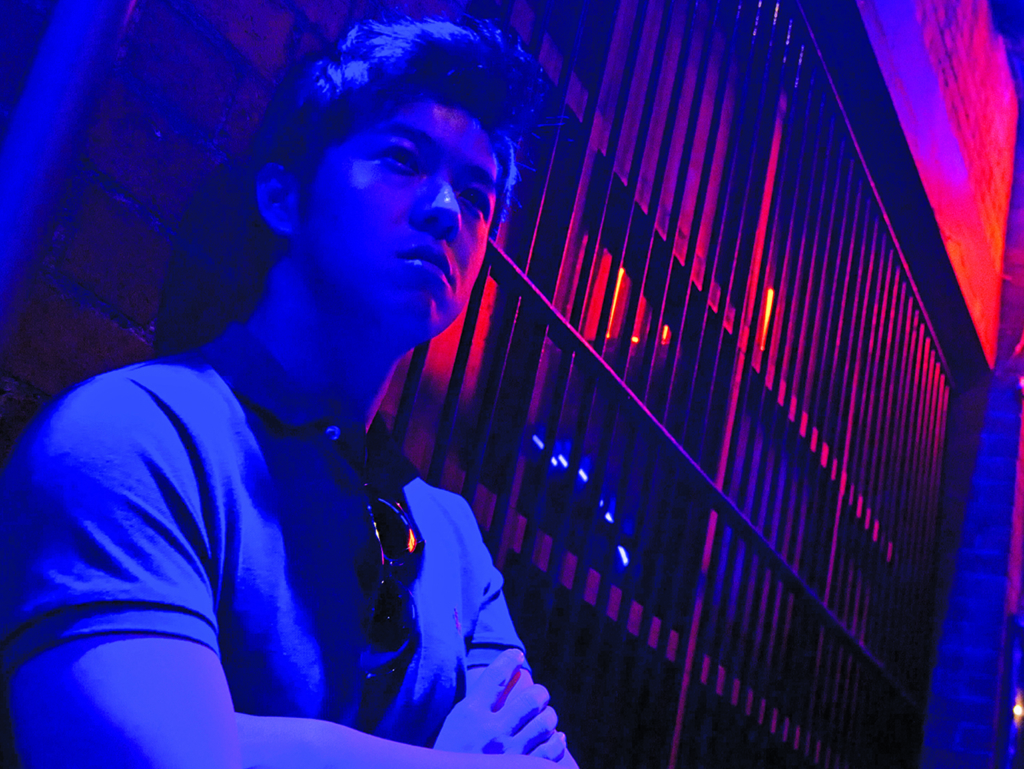Melodrama / Random / Melbourne! (2018) is an electrifyingly contemporary film. Its prolific director, Matthew Victor Pastor, has embraced the possibilities of digital filmmaking in a way that few young filmmakers dare to, having carved out a body of work that resembles little else currently being produced in Australian cinema. Here, the formally adventurous Pastor turns his screen sensibilities to nocturnal life on the streets of downtown Melbourne. An unabashedly low-budget film, Melodrama / Random / Melbourne! is brimming with ideas and unafraid to take its viewers to some ugly places as it unflinchingly surveys the underbelly of its titular city’s night-life and shines a light on contemporary race relations in Australia.
The film’s three-stroke title is reflected in its shifting structure and constant play with perspective. It begins with YouTube-style videos that introduce us to Tru Male Dynamics (stylised as ‘ᴛMᴅ’), a crew of so-called pick-up artists (PUAs). They are led by Garistar (Elliot Ng), who uses his various online platforms to chart his sexual conquests and dispenses advice to his viewership on how to ‘pick up’ women for casual sex. Garistar and his circle of ᴛMᴅ followers are also the subjects of a documentary being made by young filmmaker Aries Santos (Bridget O’Brien), who, alongside her collaborators, grapples with the ethics of depicting such odious subject matter. As Melodrama / Random / Melbourne! unfolds, we are gradually introduced to the Santos family – Aries’ sister, Angela (Celina Yuen, who co-wrote the film with Pastor), who has her own connection to the ᴛMᴅ underworld; and their mother, Agnes (Rachel E Javier, who also served as associate producer), whose story, as a migrant to Australia in the 1980s, is so different from the experiences of her second-generation daughters. In the film’s final act, the lives of its characters intersect in unexpected ways, revealing the connections that unify their seemingly disparate experiences.

As well as its narrative trickery and playing with perspective, Melodrama / Random / Melbourne! employs a number of mixed modalities. The film frequently shifts aspect ratio as it incorporates web-style footage; in particular, YouTube-style clips, Skype chats and Instagram stories branded with the ᴛMᴅ livery evoke the contemporary visual-interface lexicon of millennial communication. Pastor understands that the internet is the portal through which young people understand the world – and their phones, their conduits – as they are individually isolated yet relentlessly communicating. We witness many of the characteristic aspects of this new, technologically determined landscape of youth: ghosting, incels, fuckboys. Sex is everywhere, the charged atmosphere amplified through the all-encompassing self-representation of the internet.
Throughout the film, Aries interviews men involved in the ᴛMᴅ community, and, in another perspective shift later in the narrative, Agnes is given her own interview passages. Within these, she reflects on her arrival in Australia and the broader history of Asian migration to this country. Text frequently appears on screen, dividing the film into discrete segments. In its most explicitly alienating flourish (in the Brechtian sense[1]The ‘alienation effect’, as conceptualised by dramatist Bertolt Brecht, refers to in-text techniques employed to prevent the audience from investing too emotionally in the text and, thus, act as reminders of the text’s constructedness; see ‘Alienation Effect’, Encyclopædia Britannica, <https://www.britannica.com/art/alienation-effect>, accessed 10 May 2019.), Pastor incorporates a device he dubs ‘Cinema-O-ke’, structuring extended song sequences around pop-punk tracks and ballads written by his childhood friend Andrew Tran (credited pseudonymously as Fergus Cronkite) and accompanied by karaoke-style lyrics on screen. This, too, appears for a precise reason: during the Q&A following the screening of Melodrama / Random / Melbourne! at the 2018 Adelaide Film Festival (AFF), Pastor, Yuen and Javier all spoke of the importance of karaoke to diasporic Filipino communities and of the filmmaking team’s subsequent determination to reflect this in the resulting work.[2]Matthew Victor Pastor, Celina Yuen & Rachel E Javier, Melodrama / Random / Melbourne! post-screening Q&A, Adelaide Film Festival, 14 October 2018.

Appropriately, given the specificity of its title, Melodrama / Random / Melbourne! is a specifically Melbourne film, with much of its action playing out on the recognisable nightspots of Swanston Street and Little Bourke Street. At AFF, Pastor revealed that he chose to spend some time living in Melbourne’s city centre himself, in order to more accurately observe and chronicle the sights and sounds from which we might otherwise avert our attention: police sirens on Swanston Street, vomiting in the gutter, random acts of violence, anonymous sex in public toilets[3]Pastor, ibid. – all of which are prominently displayed in the film, swathed in Pastor’s signature pink neon light.
The film is particularly unvarnished in its depiction of sexual relations between men and women; heterosexuality operates as the unquestioned default mode for the world depicted in the film. For Garistar and his ᴛMᴅ followers, women are commodities to be acquired, used and discarded. Sex is transactional and ruthlessly depersonalised, with each act merely a number to be added to an ever-growing tally. The casual misogyny that inflects their language is shocking at times, and their view of sex is so thoroughly dehumanised that it should come as no surprise that these interactions are frequently charged with aggression and escalate into violence. While the film’s adoption of this perspective will prove challenging for many viewers, Pastor does seek to challenge it in a number of ways. Most obviously, he retains space for the filmmaker-surrogate that is Aries, whose voice is present throughout much of the film, passing commentary on the behaviour of ᴛMᴅ members as her footage plays out for us. Aries, for her part, is determined to make her documentary on this PUA community, despite the objections of her editor. And Melodrama / Random / Melbourne! does not simply portray women as passive victims. When Angela comes into contact with Garistar, she asserts her sexual agency as directly and aggressively as her male PUA counterparts; Garistar is suddenly and uncharacteristically unable to deal with this power inversion.
For Garistar and his ᴛMᴅ followers, women are commodities to be acquired, used and discarded. Sex is transactional and ruthlessly depersonalised, with each act merely a number to be added to an ever-growing tally.
The film’s oft-confronting vision of interpersonal sexual power dynamics is further complicated by its racial dimensions. ᴛMᴅ videos prominently boast of the sexual availability of ‘FOB’ (fresh off the boat) international students living in Australian city centres, their alienation and isolation easily manipulated and preyed on, and then converted into sexual availability. This power dynamic is complicated by the fact that many of the depicted members of the ᴛMᴅ community are Asian-Australians, abusing their positions of relative privilege as ‘assimilated’ inhabitants of the country to exploit new arrivals.
Pastor is unafraid to portray the undeniable reality that the ever-changing central business districts of most major Australian cities are now largely populated by international students.[4]See, for example, Julie Hare, ‘We Need to Make Sure the International Student Boom Is Sustainable’, The Conversation, 3 November 2017, <https://theconversation.com/we-need-to-make-sure-the-international-student-boom-is-sustainable-86394>; and John Ferguson, ‘Education Boom Changing the Face of Cities’ Centres’, The Australian, 28 August 2017, <https://www.theaustralian.com.au/nation/education/education-boom-changing-the-face-of-cities-centres/news-story/4f1554c1687aacc99382a085895980bf>, both accessed 10 May 2019. By night, the commuter professional class returns to the suburbs, and city streets are taken over by those in search of debauchery and the new transient population of international students. This latter group is often disconnected and isolated from their families, friends and familiar surroundings, and without adequate support services from their host institutions. While many forms of potential exploitation may be perceived in this scenario, Pastor casts his metaphor in distinctly sexualised terms.

Pastor’s intent to chronicle such pressingly contemporary phenomena is admirable. When viewed in relation to his larger body of work, Melodrama / Random / Melbourne! positions him as one of the most distinctive emerging filmmakers in Australia. Digitally shot, the film embraces its technical limitations and evokes a memorable cinematic milieu with its lush neon lightscapes – a visual characteristic that is present across much of his work. The Internet Movie Database (IMDb) lists fourteen directorial credits for the thirty-year-old Pastor, who proves himself ever prolific in the pace of his creative output. The titles of some of his earlier films – the feature Made in Australia (2013), the shorts Dinky-Di Aussie (2014) and Down Under (2015) – suggest a thematic continuity shared with his more recent work. And Melodrama / Random / Melbourne! itself is, as Pastor explained at AFF, the second instalment in an already-completed thematic trilogy.[5]Pastor, Melodrama / Random / Melbourne! post-screening Q&A, op. cit. The first entry, I Am JUPITER I Am the BIGGEST PLANET (2016) – his Victorian College of the Arts graduate film – was shot in Manila and deals with sex work on its streets. The third, MAGANDA! Pinoy Boy vs Milk Man (2018), premiered at Melbourne’s cult film event Monster Fest last year, and extends the sinister elements of Melodrama / Random / Melbourne! by featuring a serial killer preying on Asian women in Melbourne. MAGANDA! also pays homage to the Philippines’ grindhouse cinematic past,[6]See Christopher Puhm, ‘The Wild East: When the Philippines Was American Cinema’s Final Frontier’, Esquire, 21 April 2017, <https://www.esquiremag.ph/culture/arts-and-entertainment/exploitation-films-philippine-b-movies>, accessed 12 May 2019. while Pastor himself appears on screen as a neurotic film director, much as he also features briefly in Melodrama / Random / Melbourne! as one of the ᴛMᴅ pick-up artists.
Pastor’s unmistakable self-insertion into his own work evokes a Rainer Werner Fassbinder–like totalising creative presence, and the recurring casting of performers like O’Brien, Javier and Matt Furlani suggests that he is building a company of like-minded collaborators. All three return from Melodrama / Random / Melbourne! for Pastor’s recently completed Repent or Perish! (2018), which had the working title ‘A Prayer for the Filipino Family’. These titles hint at another dimension of Pastor’s work, glimpsed in the interactions of the Santos clan seen in the final act of Melodrama / Random / Melbourne!: the spectre of Catholicism, and the familial ties that both bind and restrict when an adopted nationalism fails to embrace. The importance of family and religion, as well as the pressures they can imbue, were addressed by both Pastor and Yuen at AFF. In his introduction to the screening, Pastor confided that his mother doesn’t like his films, then clarified in the post-screening Q&A that she would prefer that he make ‘less confronting’ work, which he considers fundamentally at odds with his ‘responsibility’ as an artist.[7]Pastor, Melodrama / Random / Melbourne! pre-screening introduction and post-screening Q&A, op. cit. Yuen went further, describing Filipino parents’ tendency to ‘hide behind their kindness’ while hoping for ‘conservative’ work from their children, something ‘romanticised […] lovely and kind’.[8]Yuen, Melodrama / Random / Melbourne! post-screening Q&A, ibid.

Happily, even if these distinctive new talents may not yet have achieved parental approval, they have found some prominent champions – Melodrama / Random / Melbourne! was programmed at AFF by fellow independent filmmaker Bill Mousoulis, who was responsible for curating a number of new micro-budget Australian films made without institutional support. Mousoulis has subsequently screened Melodrama / Random / Melbourne! at the LongPlay venue in inner-city Melbourne while continuing to espouse his ‘Australian new wave’ – in which he includes Pastor’s films – on his website Pure Shit: Australian Cinema.[9]Bill Mousoulis, ‘The Australian New Wave’, Pure Shit: Australian Cinema, 2019, <http://www.pureshitauscinema.com/new_wave.html>, accessed 12 May 2019. The works made by the filmmakers Mousoulis identifies are in dialogue with one another in interesting ways: Angie Black’s The Five Provocations (2018) also looks, with wry irony, at intersecting lives in Melbourne, while Saidin Salkic casts joy (The Arrival of a Phoenix, 2018) and abject terror (Silence’s Crescendo, 2018) in similarly abstract, stylistically unified terms.
But perhaps the most telling inclusion in Mousoulis’ new wave is the short that accompanied Melodrama / Random / Melbourne! at its AFF screening: Allison Chhorn’s Last Time (2018). It seems significant that Chhorn, Pastor and Brisbane’s Audrey Lam are emerging as three of our most arresting up-and-coming filmmakers. These three Asian-Australians use cinema to explore aspects of migrant identity in distinctive ways: Pastor’s relentless urgency and continual stylistic reinvention; Lam’s impressionistic documentary-fiction hybridity across mixed media; and Chhorn’s precise formal minimalism, which arrives at its own place of interiority.
Whereas the poetics of Chhorn and Lam are delivered in hushed tones, however, the stylistically maximal Pastor prefers to put his points across with an exclamation mark. And the questions that he asks of his audience carry great weight, unflinchingly highlighting the vulnerable status of international students in Australian cities. He also draws, in very personal ways, on the lives of second-generation Asian-Australians – people who were born in Australia, have lived their entire lives in Australia, speak with Australian accents and identify as Australian, yet are still indelibly marked as ‘Other’ in this migrant nation. Pastor invites us to interrogate the construction of Australianness, what cultures and identities that term encompasses, and who gets to decide who is in and who is out. We would do well to pay attention.
Endnotes
| 1 | The ‘alienation effect’, as conceptualised by dramatist Bertolt Brecht, refers to in-text techniques employed to prevent the audience from investing too emotionally in the text and, thus, act as reminders of the text’s constructedness; see ‘Alienation Effect’, Encyclopædia Britannica, <https://www.britannica.com/art/alienation-effect>, accessed 10 May 2019. |
|---|---|
| 2 | Matthew Victor Pastor, Celina Yuen & Rachel E Javier, Melodrama / Random / Melbourne! post-screening Q&A, Adelaide Film Festival, 14 October 2018. |
| 3 | Pastor, ibid. |
| 4 | See, for example, Julie Hare, ‘We Need to Make Sure the International Student Boom Is Sustainable’, The Conversation, 3 November 2017, <https://theconversation.com/we-need-to-make-sure-the-international-student-boom-is-sustainable-86394>; and John Ferguson, ‘Education Boom Changing the Face of Cities’ Centres’, The Australian, 28 August 2017, <https://www.theaustralian.com.au/nation/education/education-boom-changing-the-face-of-cities-centres/news-story/4f1554c1687aacc99382a085895980bf>, both accessed 10 May 2019. |
| 5 | Pastor, Melodrama / Random / Melbourne! post-screening Q&A, op. cit. |
| 6 | See Christopher Puhm, ‘The Wild East: When the Philippines Was American Cinema’s Final Frontier’, Esquire, 21 April 2017, <https://www.esquiremag.ph/culture/arts-and-entertainment/exploitation-films-philippine-b-movies>, accessed 12 May 2019. |
| 7 | Pastor, Melodrama / Random / Melbourne! pre-screening introduction and post-screening Q&A, op. cit. |
| 8 | Yuen, Melodrama / Random / Melbourne! post-screening Q&A, ibid. |
| 9 | Bill Mousoulis, ‘The Australian New Wave’, Pure Shit: Australian Cinema, 2019, <http://www.pureshitauscinema.com/new_wave.html>, accessed 12 May 2019. |





